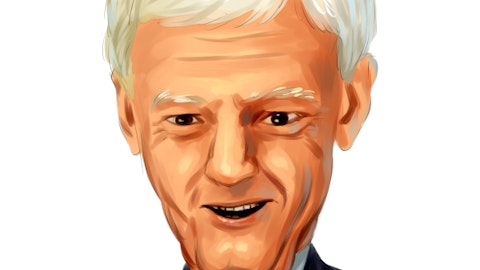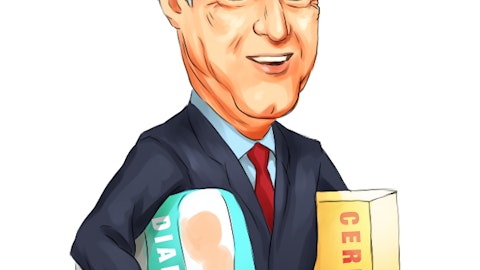David Joyce: I wanted to turn to the Liberty Live tracker. Just wondering what your opportunities and constraints are there? Conceptually, what might be some logical next steps for that? Might you buy a music venue that could allow you to spin that off in five years? Or might you do something like you propose to do with Sirius? And given that you’ve got such a discount at that equity, would that be something of interest you think with Live Nation to combine, given that they’ve got a significant cash balance now?
Gregory Maffei: Yes. Thank you, David. I think our strategies around Liberty Live are evolving. We do look at it, as you’ve seen in the past, is something we’ve been able to do expand and grow, creating an ATB there so that we could potentially have a spin down the road. That’s always something Liberty wants to maintain optionality around. But our first goal would probably be to build a strategy and maybe in conjunction with Live Nation around things that are incremental and additive that we could own that we think are positive that could somewhere potentially be valuable to Live Nation as well. So no plan or intent today on any of the above, but we’re — we have ideas and they’re working through.
David Joyce: And second, if I could, on the Atlanta Braves on the RSN side of the equation, that’s significant revenues annually that’s coming from the RSNs. Is there any update or any thoughts on how that could be replaced if needed, either by the league or your own capabilities?
Gregory Maffei: Derek, do you want to handle that?
Derek Schiller: Yes, sure. So obviously, there’s ongoing legal with this situation. So we don’t want to go too far with what we can say on it. I think probably the best way to answer this is we are continuing to deliver what we are expected to do under the terms of our agreement. And up to this point in time, they are you expect that to continue.
Gregory Maffei: Yes. Derek’s way being more cautious than I would. I think our understanding is this is among, if not the most profitable of Diamond’s RSNs reflecting the large territory we have, the high demand that Derek and his team have built around the brave and the relatively not the highest payment among RSN payments. It is a very profitable in our sense. So I do not believe they will be rejected. But given the strength of the territory and the strength of the Braves, people’s interest in Braves embrace, I do believe we could replace that revenue stream or a good portion of it at least with other alternatives.
Operator: Our next question comes from the line of Jason Bazinet with Citi.
Jason Bazinet: I just had a question on Formula One. You guys have accomplished so much with this asset since you bought it. The concrete agreement growing sponsorship, tweaking the calendar, increasing popularity of the sport. I would just be curious, over the next three to five years, other than getting to know your fan base better, which you mentioned, what do you think the top two or three opportunities that remain are?
Gregory Maffei: Look, I think we have three or four big revenue streams, and I think all of them have upside starting with broadcast. The increased interest in the sport globally, but particularly in the U.S., have given us an opportunity with a broader range of distributors and the increasing number of digital players who might enter the market. And as they get broader awareness as sports players or willingness to go with them only increases. So you’ve seen examples like the Zone, you’re seeing things like Netflix coming and doing something with us around golf and Formula One, admittedly small, but an interesting start. All those make us have opportunities there. In the races, yes, we are not going to increase the number of races at — certainly at the pace, if at all, that we have.
But in a perverse way, the fact that there’s a limited supply and an increasing number of people who want a race in increasing number of cities or venues that want to race have allowed us, in many cases, to utilize that limited supply to play off, raise the requirements, raise our prices and promoters are doing far better if you’ve seen, for example, how many people showed up at Austin, how many people are showing up. The increase in demand has made it so promoters are more profitable, have more scale, and we’re able to extract more money from them not in the victim way that some people would call it, but because it’s a better business for them and there are other players who want to bid if they don’t want to play. In sponsorship, you’re seeing us have grown that dramatically over the last several years.
I think far more we can do. Amex is a great example, moving from a world that just paints on the track to a digital experience, to activation. Part of that’s, again, understanding our customers better, all of those, I think, have an opportunity. And then hospitality and Quint is a part of that. What we’re doing — what we’ve been able to do, increase the Paddock Club, frankly, because of demand, how we’ve been able to increase prices at the Paddock club, all those give us, I think, a range of opportunities in hospitality. So I think all four revenue streams are healthy and have upside. Stefano, what did I miss?
Stefano Domenicali: I think that the list is already quite interesting and full. But for sure, the concept that we have seen about Amex, the regionalization is another key factor of attracting new partners, and this was going to be our strategy. But we do not forget that two other areas, for sure, will be very important, is licensing and merchandising, where we just at the beginning of restructuring where we can really see potential of what we can do. I mean we don’t have to also underestimate the potential of being bigger on social and bigger on the of the sport and being able to connect more and more with this new initiative with our fans, we will be able to provide services that, of course, we have to pay back for us. So an incredible time in front of us. And that’s the beauty of the sport that we are investing now really believe in it in
Gregory Maffei: I believe our last question.
Operator: Our final question comes from the line of Barton Crockett with Rosenblatt Securities.
Barton Crockett: I was curious, Greg, about your thoughts about the opportunities for baseball overall to create a better streaming experience than the kind of fragmented circumstance that’s developing right now with teams doing their own kind of local streaming, their own local broadcast. Do you think over time there should be some type of aggregation of the local team rights into new streaming or an existing streaming platform to optimize kind of the experience from a market opportunity and from a consumer experience perspective? Do you think that should happen? Do you think it can happen if you guys play a role on that, that creates value for your shareholders?
Gregory Maffei: I’ll comment, and then I’ll let Derek add. Baseball was an innovator with mlb.com, everything back to Bob Bowman that they did with BAMTech. And much of that has been accrued to the benefit. And I think with the increased interest in the sport this year, all to the good, you’re right that the local rights regime is complicated. And how that has been divided has made probably some innovation more difficult over time. We, at various times, have looked at that and potentially partnering with MLB to help on that. I think there are many plans out there being looked at, none has yet come to pass, but there’s surely a demand in the sport. Derek, what would you add?




